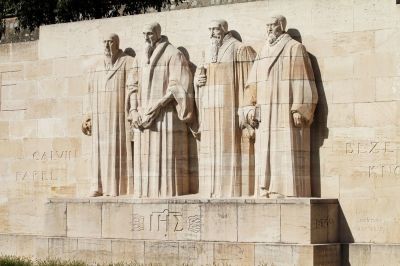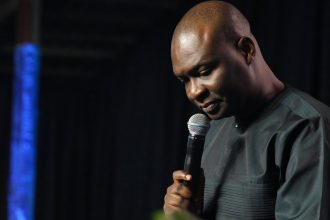
Editor’s Note: Given the ongoing debate over free will and predestination, we are running both articles from multiple perspectives.
“The LORD is good to everyone. He showers compassion on all his creation” (Psalm 145:9).
One critical metric that can be used to determine if a proposed deity is the true God of the Bible is his goodness. If the deity being offered by any religious system is not “good to everyone,” he/she/it is not the God of the Bible. He/she/it is a counterfeit, a different god.
False gods
Most Christians easily recognize the fraudulent, feckless nature of the mythological gods and the gods of false, non-Judeo/Christian religions. The Bible clearly dismisses such powerless idols as counterfeit and admonishes those who follow them.
“Behold, you are nothing, and your work is less than nothing; an abomination is he who chooses you” (Isaiah 41:24).
Yet, a false deity becomes a bit more difficult to detect when its attributes approximate those of the true God, the God of the Bible. Imitation has always been the ploy of Satan and his demons. The enemy has always sought to cloak himself in God’s clothing. In contemporary terms, Satan would be accused of “cultural appropriation” of the divine.
The God of Calvinism
Before publishing my book, God’s Elect: The Chosen Generation, I sent the manuscript to a friend — a pastor of the Reformed (Calvinistic) persuasion — for review. Although I knew he would disagree with my understanding of the biblical doctrine of election, there was one statement from the book that greatly concerned him.
At the conclusion of chapter one, I state, “the god of Calvinism [is] not the God of the Bible.” This statement, he wrote, “put[s] Calvinists outside the pale of Christianity and under the judgment of the First Commandment.” In other words, he rightfully noted that my statement infers that Calvinists are worshiping a false god, a god who is not good.
To help us determine whether the deity proposed by Calvinism is good, let’s take just a moment to review what Calvinism (Reformed theology) teaches regarding God’s purpose of election in the Bible. Below is a definition that I believe accurately represents the Calvinistic understanding of unconditional election.
“All (people) are not created on equal terms.” God, from before the foundation of the world, divided all people into two groups; those He chose to save (the elect), and those who were not chosen (the non-elect/reprobate). The elect will go to Heaven. The non-elect will go to Hell. God’s election is unconditional and final.” (John Calvin, Institutes of the Christian Religion, Book III, paragraph 5.)
Since “narrow is the gate that leads to eternal life and few find it” (Mat 7:14), the implication is that the deity proposed by Calvinism has irrevocably consigned billions upon billions of people (which likely includes many of those we love — family members, friends, neighbors) to a hopeless life that will end in eternal torment with no opportunity to change their predetermined future.
To justify such a seemingly cruel and capricious deity as “good,” some Calvinists will argue that perhaps there is some “greater good” that God seeks — a “good” that we humans just can’t understand.
While conceding that there is much about God that is inscrutable, I propose that divine goodness is not a mystery. As creatures made in God’s image, it’s clear that we not only share the same understanding of goodness with God but we are commanded to imitate His goodness in our dealings with others.
“Turn away from evil and do good; seek peace and pursue it” (Psalm 34:14).
“Do not neglect to do good and to share what you have, for such sacrifices are pleasing to God” (Hebrews 13:16).
These commands would be meaningless if our understanding of what God has determined to be “good” was unknowable to us.
Benevolence
There is clearly an element of benevolence associated with divine goodness. Goodness implies kindness, mercy, compassion, goodwill, and charity. So, when the Bible says, “The LORD is good to everyone. He showers compassion on all his creation” (Psalm 145:9), He is telling us that, out of His love for his creation, God desires and acts to promote the well-being of his creatures — all of his creatures. God’s goodness, then, is an expression of His love.
The deity of Calvinism models no such benevolence for the vast majority of people. Although some Calvinists maintain that God shows His love for everyone by providing “common grace” to both the elect and the non-elect, John Wesley, upon reflecting on the Calvinist god’s predetermined condemnation for the non-elect, once pondered, “Is not this such a love as makes your blood run cold?”
Final thoughts
Much is made in some Calvinistic circles about God’s unwavering commitment to the value of His glory, and rightfully so. Yet, note that God reveals his glory in terms of his goodness.
“Moses said, ‘Please show me your glory.’ And [God] said, ‘I will make all my goodness pass before you …’” (Exodus 33:18-19).
In other words, God’s goodness is His glory. Simply put, no goodness, no glory — no glory, no true God.
A false god can be portrayed as beautiful — even as an “angel of light” (2 Cor 11:14). A false god can be presented as powerful, omniscient, and sovereign. While these are certainly attributes of the true God, if the beautiful, powerful, omniscient, sovereign god is not good, it is a false god.
Calvinism proposes a deity who is not “good to everyone,” a deity who does not “shower compassion on all his creation.” The deity proposed by Calvinism is a corruption of the true God. It is a different god, a god who is definitely “outside the pale of Christianity.”
John Chipman currently serves as a Teaching Pastor at The Spoken Word Christian Church in Rancho Santa Margarita, California. Prior to joining the staff at The Spoken Word, John faithfully served as a chaplain in the Orange County Jail Ministry. He is the author of God’s Elect: The Chosen Generation and publisher of the Christian blogsite Bibleinsights.net







